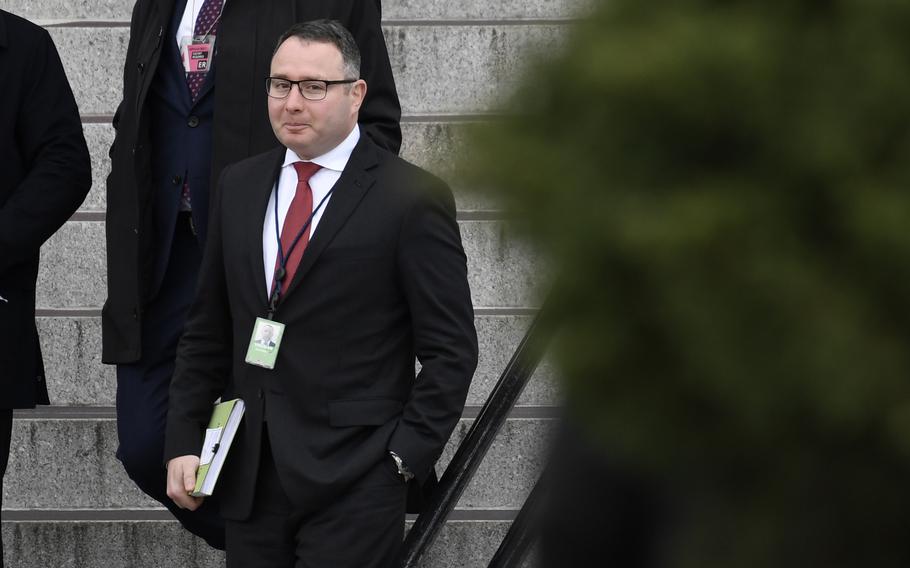
In this Jan. 27, 2020, file photo Army Lt. Col. Alexander Vindman, a military officer at the National Security Council who testified during the impeachment hearings on Capitol Hill, walks down the steps of the Eisenhower Executive Office Building on the White House complex in Washington. Vindman who was a pivotal witness in the first impeachment case against Donald Trump has sued the oldest son of the former president and other Trump allies, accusing them of participating in an “intentional, concerted campaign of unlawful intimidation and harassment” over his decision to testify. The suit from Vindman was filed Wednesday, Feb. 2, 2022, in federal court in Washington. (Susan Walsh/AP)
WASHINGTON — Army Col. Yevgeny Vindman, who along with his twin brother raised alarm about President Donald Trump's actions toward Ukraine, precipitating the first of two impeachments, suffered a "swift" reduction in responsibilities advising the White House and probably was punished for speaking out, according to the findings of an investigation released Wednesday.
The Defense Department inspector general's office determined it is "more likely than not" that Vindman, an Army officer who in 2019 was assigned to the National Security Council, "was the subject of unfavorable personnel actions and that these were in reprisal for his protected communications" with superiors.
The subject of Vindman's concern was a call in which Trump implored Ukrainian President Volodymyr Zelensky to have the government in Kyiv open a corruption investigation of Trump's political rival Joe Biden, who as vice president under President Barack Obama led much of the administration's outreach to Ukraine and made numerous trips to meet with its leaders.
The inspector general's office recommended no action be taken in Vindman's case, noting that Army officials promoted him to his current rank last year and removed an unfavorable performance review that Trump administration officials had issued.
Vindman and his brother, Alexander Vindman, were among those dismissed from their jobs by national security adviser Robert O'Brien in February 2020 shortly after Trump's first impeachment trial ended with a Senate acquittal. Trump stood accused of abusing his authority, by seeking to withhold military aid intended for Ukraine when Zelensky declined to direct an investigation of Biden, and then obstructing Congress's efforts to investigate those claims.
Vindman said in a phone interview Wednesday night that he was gratified by the inspector general's decision, but would like to see U.S. officials consider action against those cited in the report. His career was adversely affected by the situation, he said. He suggested that a review of whether they should keep security clearances might be one option.
“What happened to me and my brother is an outrage — one of many committed by the former president and his staff,” Vindman said.
The inspector general's findings are a remarkable declaration that the Trump administration's treatment of whistleblowers was inappropriate. A separate Army investigation cited in the watchdog's report found that NSC attorneys John Eisenberg and Michael Ellis, who issued Yevgeny Vindman a harsh performance appraisal, lacked objectivity and that it "would be difficult to justify" their negative assessment.
Eisenberg attorney William A. Burck said in a statement that the inspector general "stacked the deck" against his client "to reach the conclusion they desired rather than one dictated by facts." Inspector general investigators did not interview Eisenberg, the statement says, because no agreement was ever reached on what would be asked.
"Mr. Eisenberg acted professionally and lawfully and the defamatory allegations by the IG are politically motivated fiction," the statement said. "It's a sad and dangerous day when government investigators pursue politics instead of facts."
Ellis attorney David W. Butler said in a separate statement that the report released Wednesday was "based on a biased and incomplete investigation."
Ellis was willing to cooperate with the investigation, the statement said, but investigators "refused to provide access to basic documents" in the case and appeared to not consult with other documents in government possession "that would directly contradict the cherry-picked evidence and self-serving statements made by individuals the IG did interview." The statement did not elaborate.
O'Brien elected to not sit for an interview with the inspector general's investigators, the report says, and declined Wednesday to comment on the findings.
"It was and is my policy not to comment on personnel matters," O'Brien said in a text message. "Thank you for reaching out."
Trump's resentment toward the Vindman brothers may have prompted their dismissal, the inspector general found.
"President Trump specifically identified the Complainant with ire as he defended his telephone call to President Zelensky, and considering the Complainant's close association with his twin brother and that both reported President Trump's alleged misconduct, the Complainant's communications could well have motivated any administration official to take action against him," the report said.
Alexander Vindman, now retired from the Army, also was assigned to the NSC and listened in on the July 25 phone call in which Trump asked Zelensky to "do us a favor." He reported the interaction to Eisenberg, drawing the ire of many Republicans who questioned his credentials, motivations and trustworthiness.
The brothers were born in the Soviet Union and emigrated to the United States as children. During the public impeachment hearings, Alexander Vindman appeared in his military uniform and read a statement in which he promised their father that he would "be fine for telling the truth," something that would not have been the case in the Soviet Union.
- - -
The Washington Post’s Alice Crites and Karoun Demirjian contributed to this report.